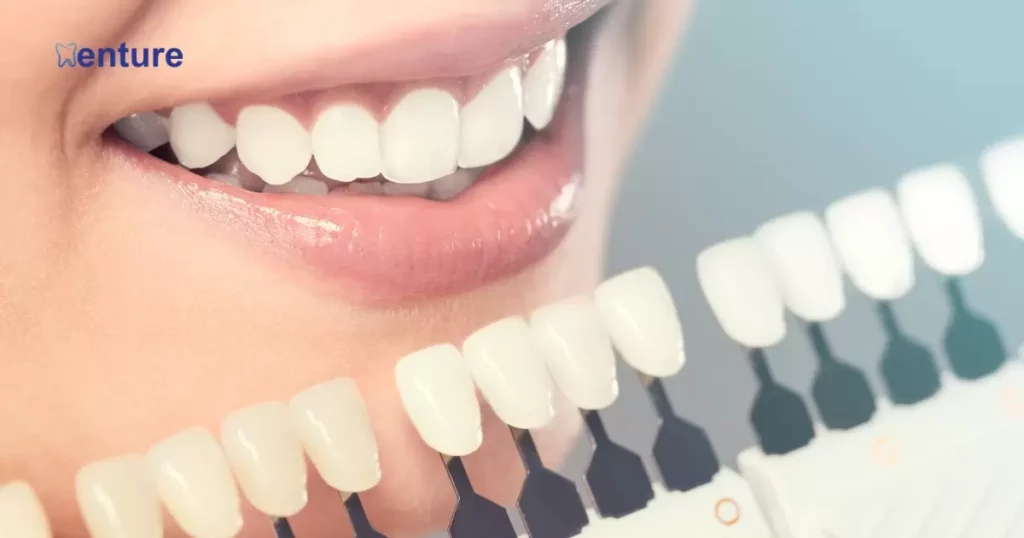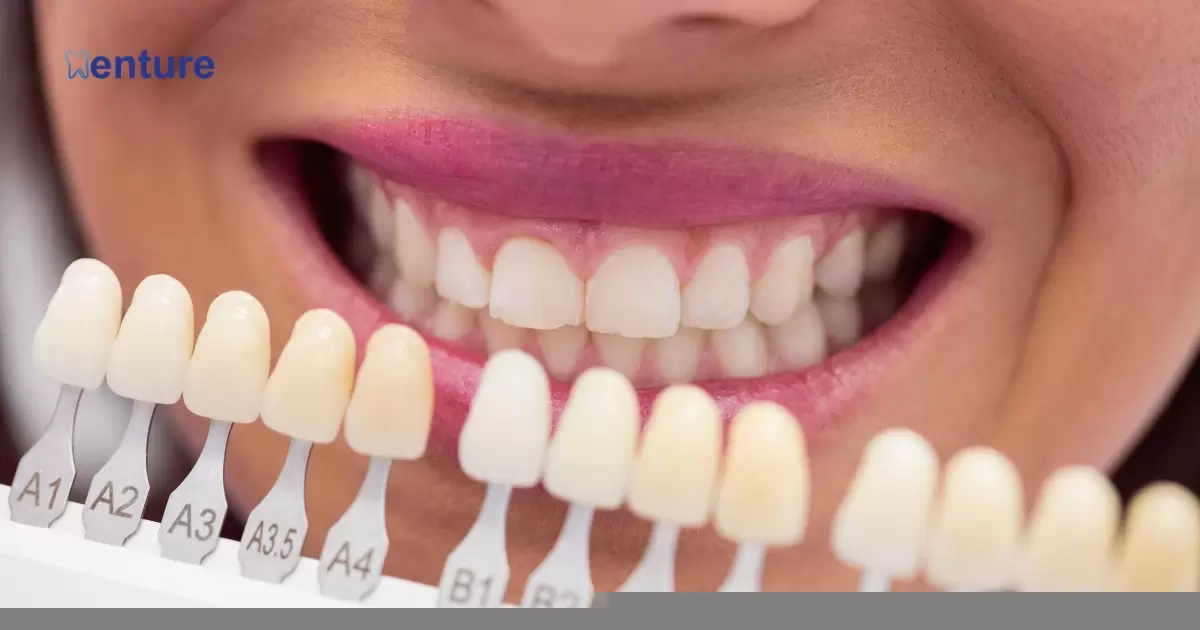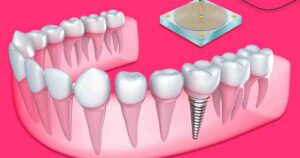Veneers and dentures are types of dental treatments. Veneers are thin shells placed on teeth to improve their appearance, while dentures are removable false teeth for people who’ve lost their natural ones. Veneers enhance your smile by covering imperfections, like stains or chips.
Curious about the difference between veneers and dentures? You’re not alone. Veneers are like dental facelifts, covering tooth imperfections with thin shells. Dentures, on the other hand, are removable replacements for missing teeth, helping with eating and talking.
When it comes to dental improvements, understanding veneers and dentures is key. Veneers offer a cosmetic boost, concealing flaws in your teeth. Meanwhile, dentures serve as functional replacements for missing teeth. Both have their unique roles in achieving a brighter smile and better oral health.
What are veneers?
Veneers are thin coverings placed over the front surface of teeth. They are custom-made from materials like porcelain or resin composites. These shells bond to the front of the teeth, transforming their color, shape, size, or length.
Veneers are popular for enhancing smiles, especially for those with stained, chipped, or uneven teeth. They provide a natural tooth appearance with resilience and strength similar to natural tooth enamel.
| Aspect | Veneers | Dentures |
| Purpose | Cosmetic enhancement of teeth | Replacements for missing teeth |
| Material | Porcelain or resin composite | Acrylic, metal |
| Application | Thin shells bonded to teeth | Custom-fit removable false teeth |
| Types | Porcelain and composite veneers | Complete and partial dentures |
| Procedure | Enamel removal, customization | Impressions, custom creation |
| Benefits | Enhance appearance, durability | Aid in eating, speaking, comfort |
| Drawbacks | Irreversible, maintenance | Less stability, initial discomfort |
| Longevity | 10-15 years or more | Around 5-10 years |
| Feel in the mouth | Feel like natural teeth | Bulkier, may take time to get used |
| Cost | Generally more expensive | More affordable for missing teeth |
What are dentures?
Dentures are artificial teeth designed to replace missing natural ones. They come in two main types: complete and partial. Complete dentures replace all teeth in the upper or lower jaw. Partial dentures replace a few missing teeth and can be attached to your remaining natural teeth. Dentures help with chewing, speaking, and enhancing your smile.
Dentures are removable teeth made from materials like acrylic and metal. Difference Between Dentures And Implants: They’re custom-fit for your mouth, ensuring comfort and functionality. Regular care and adjustments are essential to keep your dentures in good shape.
Complete dentures
Complete dentures are a type of denture that replaces all the teeth in either the upper or lower jaw. These dentures are custom-made to fit your mouth, ensuring a snug and comfortable fit. They’re typically made from acrylic, making them lightweight and natural-looking.
To get complete dentures, your dentist will first remove any remaining natural teeth and take measurements of your mouth. It might take a few appointments to create and adjust your dentures to ensure they fit properly.
Partial dentures
Partial dentures are a type of denture designed to replace only a few missing teeth. They are custom-made to fit your mouth and are often attached to your remaining natural teeth using clasps or precision attachments. These dentures are a practical solution when you have some gaps in your smile but don’t need a full set of replacement teeth.
Made from durable materials like acrylic and metal, partial dentures are designed for comfort and functionality. They help with chewing, speaking, and maintaining the alignment of your remaining teeth.
What’s the difference between dentures and veneers?
Dentures and veneers serve distinct purposes in the realm of dental care. Veneers, resembling dental facades, are thin shells placed on the front of teeth to mask imperfections such as discoloration or chips. They contribute primarily to enhancing the aesthetic appeal of one’s smile.
In contrast, dentures are removable replacements for missing teeth, aiding in chewing and speaking. Their functionality extends beyond appearance, addressing practical aspects of oral health. Understanding the disparity between veneers and dentures helps individuals make informed decisions about their dental needs.
Dentures vs. Veneers The Procedure

Let’s begin with the procedure for veneers. First, your dentist will remove a tiny bit of enamel to make room for the veneer. Then, they take an impression and send it to a lab for customization. Once ready, the veneer is bonded to your tooth, instantly enhancing your smile.
Now, when comparing veneer vs denture, the process for dentures differs. It starts with impressions taken of your gums and any remaining teeth. A lab then creates your custom dentures. Afterward, they’re fitted in your mouth, ensuring comfort and functionality.
Understanding the Distinction: Veneers vs. Dentures
Veneers and dentures serve distinct purposes in dental care. Veneers are thin shells, custom-made to cover the front surface of teeth, ideal for enhancing aesthetics by correcting imperfections like discoloration or chips. On the other hand, dentures are removable replacements for missing teeth and surrounding tissues. They come in partial or full sets and are crucial for restoring functionality, enabling proper chewing and speaking.
Veneers: Aesthetic Enhancement
Veneers are primarily cosmetic solutions, often sought to improve the appearance of otherwise healthy teeth. They’re typically made from porcelain or composite resin, meticulously crafted to match the natural color and shape of existing teeth. Dentists bond veneers to the front of teeth, effectively concealing stains, gaps, or irregularities, resulting in a brighter, more uniform smile. However, they’re not intended for restoring function or addressing significant structural issues.
Dentures: Functional Tooth Replacement
Dentures, whether partial or full, are indispensable for individuals missing several or all of their teeth. Crafted to fit comfortably in the mouth, they restore chewing ability, support facial muscles, and prevent remaining teeth from shifting. While conventional dentures are removable, advancements like implant-supported dentures offer increased stability and durability. Dentures not only enhance oral function but also contribute to overall well-being by restoring confidence and enabling a natural, comfortable eating experience.
The Benefits & Downfalls
Veneers can significantly enhance your smile, boosting confidence and self-esteem. They effectively cover stains, chips, and gaps, creating a natural and appealing look. The process is irreversible and may require regular maintenance, which can be a downside.
On the other hand, dentures provide a practical solution for those with missing teeth, aiding in eating and speaking comfortably. Yet, some may find them less stable than natural teeth and may experience initial discomfort.
Types of veneers
First, you have porcelain veneers, thin shells of porcelain custom-made to fit your teeth. They offer a natural look and durability. Composite veneers, on the other hand, are made from a resin material and can be more budget-friendly.
Composite Veneers
Composite veneers, a popular choice for smile makeovers, are crafted from a resin material. These veneers are directly applied to your teeth and shaped by your dentist. They’re a quicker and more affordable option compared to porcelain veneers, making them a good choice for minor cosmetic improvements.
Application Process of Composite Veneers
Applying composite veneers is a straightforward process. First, the dentist cleans and prepares the tooth surface. They then apply the composite material, carefully shaping and bonding it to the tooth.
The Benefits of Composite Veneers
Composite veneers offer several advantages. They’re a more affordable option compared to porcelain veneers. These veneers can be quickly applied in a single visit, saving you time. They’re also more flexible in terms of reshaping and repairing if needed.
Disadvantages of Composite Veneers
Composite veneers have their downsides too. They tend to stain more easily than porcelain ones, which means they may require frequent cleaning. Additionally, they are less durable and may chip or break more readily.
FAQ’s
Do veneers and dentures feel the same in the mouth?
No, veneers are thin and feel like your own teeth, while dentures are bulkier and can take time to get used to.
Which is more expensive, veneers, or dentures?
Veneers are generally more costly due to their cosmetic nature, whereas dentures are a more affordable solution for missing teeth.
How long do veneers and dentures last?
Veneers can last 10-15 years or more, while dentures typically last around 5-10 years before needing replacement.
Conclusion
Understanding the difference between veneers and dentures is essential. Veneers offer cosmetic enhancements, concealing imperfections with porcelain or composite materials. They are durable and require minimal maintenance. On the other hand, dentures provide functional teeth replacements for those who’ve lost their natural ones.
In your quest for the perfect smile, remember that veneers are ideal for improving the look of your existing teeth. They can correct discoloration, chips, and gaps, enhancing your confidence. If you’re looking for a more comprehensive solution to replace missing teeth, you may want to consider the differences between veneer vs denture options.











